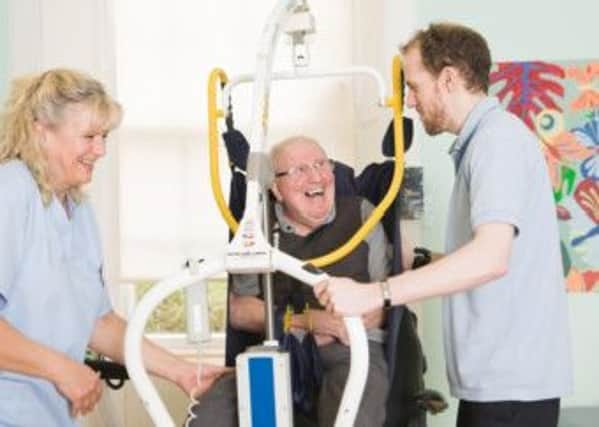Leuchie House: Carers need to be cared for too


AS THE recent Carers Week fades from memory, it is important that the plight of Scotland’s 650,000 carers does not fade from our consciousness, especially as the number of people finding themselves devoting their lives to caring for a family member is on the rise.
The challenges surrounding long-term caring are very much to the fore when it comes to respite, as it is just as important for those looking after people with long-term conditions to have access to quality respite care as it is for the people coping with these conditions on a daily basis.
Advertisement
Hide AdAdvertisement
Hide AdIf the person looking after a family member falls ill themselves – often through a lack of time to care for themselves properly – it becomes an added burden on the NHS and social services in Scotland, as well as the personal toll such difficulties can take on families.


It is estimated that the one in eight people finding themselves filling the role of carer for a family member save the health and social care system in Scotland £10 billion each year.
Leuchie House in East Lothian is the only place in Scotland offering vital respite care breaks for people and their carers who are dealing with long-term conditions such as Huntington’s disease, multiple sclerosis, Parkinson’s disease, motor neurone disease, stroke and spinal injuries.
An 18th-century classical mansion in the East Lothian countryside, Leuchie House is an example of integrated health and social care, with guests and carers offered a relaxing break with the option of activities and the added benefit of 24-hour expert nursing care. It is run as a centre for holidays, not as a clinical environment. The ethos is very much on quality and choice, for the benefit of the guests.
For many of the people who come here for breaks, the only alternative available to them for respite would be an old people’s home or hospital, and this would be highly unsuitable for many younger guests and those who see their respite as a means of stimulation and a break from their daily routine.
Many carers have had to give up work to care for a family member and in some cases may be sacrificing time with other family members to do so. They may experience feelings of isolation in their new role and need emotional as well as practical support. Carers can lose out not only on health and wellbeing, but also on income, pensions, friends and social opportunities.
One of the statistics from the Prepared to Care? report that was produced during Carers Week showed that eight out of ten carers were not aware of the support available because of the time it took them to identify themselves as carers. It also showed a third of carers were given the wrong advice about support available, again because of the time it took to identify themselves as carers.
This denial about the role being permanent is something that we see frequently, with many people considering respite care as an option for the first time also denying the reality of a long-term condition. They, and their carer, often find it difficult to trust their complex care needs to someone other than a family member.
Advertisement
Hide AdAdvertisement
Hide AdBut the high rate of people returning to us shows that once they transfer that trust from a family member to the dedicated staff, they recognise the benefit both to themselves and to their carers – who can stay in separate carers’ accommodation, where they can get a complete rest whilst being on hand for their family member, or can enjoy a rare break knowing that their loved one is being looked after.
Carers Week helped to highlight the challenges faced, but it is important to stress how easy it is for carers in our society to fall under the radar – sometimes through their own reluctance to be seen as such.
Which is why places such as Leuchie House need to speak out on their behalf and make sure that the funding to which they are entitled for respite care is easily accessible.
After all, there are now estimated to be 6.5 million carers in the UK and this figure is predicted to reach 9 million by 2037. We need to look after them – they may be looking after us one day.
• Mairi O’Keefe is chief executive officer of Leuchie House